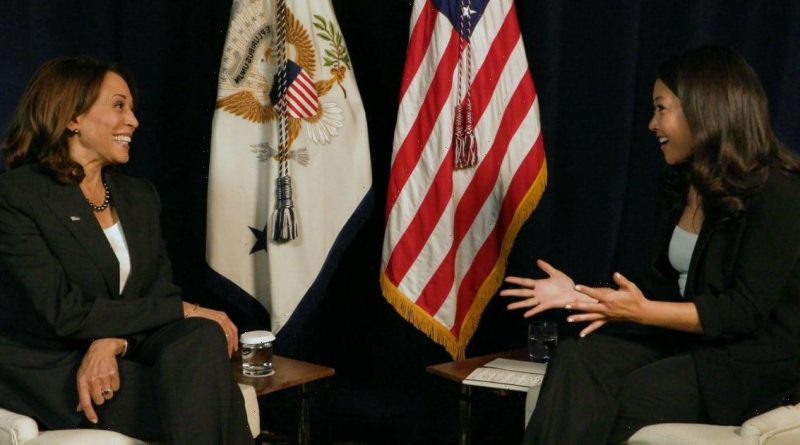We Got 15 Minutes With Vice President Harris. She Talked Abortion, Beyoncé, and Her Greatest Fear For Women.
Monday was one of those perfectly sunny, not-too-hot days in Los Angeles, the palm trees tattooing the cerulean sky — a first-rate welcome for the vice president of the United States. Although Kamala Harris had traveled here for one particularly grim reason — to raise the alarm about what’s at stake for abortion rights in the midterms — there was still a streak of optimism about her. She was in her home state of California, after all, where voters are expected to protect the right to reproductive freedom in the state’s constitution come Nov. 8.
That’s not the case in much of the country since the Supreme Court overturned Roe v. Wade, which is why Harris talked about feeling “fear,” too, at an event at the Nate Holden Performing Arts Center on Monday. She appeared alongside some of the state’s highest-profile Democrats: LA Mayor Eric Garcetti, Attorney General Rob Bonta, Sen. Alex Padilla, and Rep. Karen Bass, who all expressed a forceful commitment to defending women’s bodily autonomy. As Bonta put it: “If you seek an abortion here, you will be protected.”
It makes sense that Harris — the first woman and the first Black and Asian American person to ascend to the second-highest office in the United States — has been leading the administration’s work on an issue that disproportionately affects women of color. Her fight for reproductive rights is personal in other ways; her mother, a breast-cancer researcher, dedicated her career to it.
“I remember my mother being so passionate about women’s health: women having dignity in their healthcare and having power over their decisions,” she told the crowd.
Later in the day, when Harris sat down for an exclusive interview with POPSUGAR, she reiterated that belief. “It’s about freedom and liberty,” she told us. “Like, seriously. You’re going to suggest that my government tells me when I should start a family? If I should start a family?”
A day later, President Joe Biden promised that the first bill he’d send to the newly elected Congress in January would codify Roe v. Wade — if it has the votes to pass. For that to happen, Democrats need to hold onto their seats in the House and expand control in the Senate. Abortion is on the ballot in other major ways, too, whether directly, like California’s proposition, or in gubernatorial campaigns and local races.
With less than a month until the midterms, Harris spoke with us about why voting is so essential in this moment, what the administration is doing to protect other threatened rights, and what advice she has for living in a post-Roe America. We even broached a reader-favorite topic: Beyoncé.
POPSUGAR: Vice President Harris, thank you so much for taking the time to speak with us about what is such an important issue. I know that you’ve been traveling the country meeting with lawmakers and medical providers and advocates. I wonder, given all of those conversations, what do you think is crucial for voters to know about what’s at stake for abortion rights and bodily autonomy in these midterm elections?
Vice President Kamala Harris: Well, let’s put where we are in context. The United States Supreme Court, which is the highest court in our land, just took a constitutional right that had been recognized from the people of America, from the women of America. And what this means is that they have basically said — and states are basically suggesting — that the government is in a better position to tell a woman what she should do with her body than she is.
I think we have to make clear that we trust the women of America to make decisions based on their best interest defined by them. That’s where elections matter. Because sadly, what has happened is that the court has acted, and now we need Congress to act, which means that we need people in the US House of Representatives and the US Senate who are prepared to fight for a woman’s right to make decisions about her own body and not her government making those decisions for her.
PS: Besides voting, what can people do if they want to support abortion rights in this moment, and I wonder, on your end, what is the administration doing on this issue?
KH: Well, I do want to stress that if we are going to be able to stop . . . so many states from doing what they’re doing, which is passing these abortion bans, passing bans with no exceptions for rape or incest, criminalizing healthcare providers — I mean, criminalizing doctors, nurses, healthcare providers. If we’re going to stop that, we’re going to have to have a national law that says we will protect and defend a woman’s right to make decisions about her own body. And the only way that’s going to happen is to have the people in the United States Congress who will support that and have it in the numbers that we need, which is about two more United States senators and holding onto the House. So I have to really stress that.
But also, why do elections matter on this issue? Because in those states that have criminalized healthcare providers, it matters who your county prosecutor is. So take a look at those races. It matters who your governor is, because if you’re in a state where the legislature is maybe trying to pass a ban on reproductive healthcare but your governor is prepared to veto it, right, or if you have a governor who says, “I protect the woman’s right to make decisions about her own body,” that’s going to be important. So there’s that.
The work that can be done also includes supporting providers. But also it includes supporting women. You know, there’s so much about this issue that I think has been designed and meant to make women feel ashamed or embarrassed or make them feel alone. One of the things I can’t stress enough is to remind people they are not alone, they’re not alone. And they’re not being judged. That’s very important. And it’s also really important to use your voice in a way that provides clarity around what a person’s rights are, so that people won’t be alone and confused about where to go for help.
PS: Absolutely. We’ve spoken with a lot of folks who have had abortions, and what we hear is that so often, the decision is not political, it’s totally personal.
KH: No, of course not.
PS: So I wonder, on that personal level, what do you wish people better understood about the real importance of access to safe and reliable reproductive healthcare?
KH: Well first, I think one of the biggest issues here is that it’s about freedom and liberty. Like, seriously. You’re going to suggest that my government tells me when I should start a family? If I should start a family? Are you seriously suggesting that my government is in a better position to tell me what I do with my body than I am?
It’s just so basic, and the idea that we’re at this place in 2022 — where the government is telling the women of America . . . It’s . . . It’s bananas. In addition to being so scary and backwards.
Progress in our country has, up until this point, been about the expansion of rights, not the restriction of rights. This is taking us backwards. And my greatest fear is for all of those women out there who are silently suffering and don’t know where to go for help, who become desperate because they believe no help is available to them. And so what I want for everyone is again, to know they’re not alone and there is help available. And I know you’ll be giving information out to folks about where that help is.
So many of the laws are — depending on the state — so different, so we need to clear up the confusion. And this is a time for us to also understand that there was a movement led by courageous women and men and people of all genders that resulted, 50 years ago, in the Roe v. Wade decision. We now are the ones who have to pick up that movement and do it in a way that’s also about building the coalition, because here’s the reality: for so many people, the same people who are attacking a woman’s right to have access to reproductive care, are the same people attacking voting rights, are the same people attacking LGBTQ+ rights. And so let’s also work on building up the coalition, where we remind people that it’s not only about one group of people. It’s about everybody. And that’s why everybody needs to stand up for these principles that were part of the founding of our country, which are about fighting for freedom, fighting for liberty.
PS: Right. I was going to ask, with the Dobbs decision, obviously other protected rights are at stake. Interracial marriage, same-sex marriage, contraception access. How is the administration fighting to protect those rights?
KH: So, a number of things. We have, on the list of what the president is prepared to sign, he’s prepared to sign national legislation, federal legislation, putting in place the protections for access to reproductive care. It’s called the Women’s Health Protection Act. But we need two more senators for him to be able to sign it. And what that means is that if that bill gets passed, if he’s able to sign it into law, these states can no longer ban abortion without exceptions for rape or incest. They can no longer punish doctors and nurses and healthcare providers. So that’s important.
He will also — if we have two more Senate seats — sign the John Lewis Voting Rights Act and the Freedom to Vote Act. And that’s really important to restore people’s rights, because in so many states — especially because we have such great youth voter turnout — I think that one of the things that happened is it scared these states into saying, “Let’s make it a little more difficult for them to vote. Because when they vote, they do things like say, ‘Nobody should go to jail for smoking weed.'” [Laughs] But because young voters voted and said that, we agree — and I agree, people shouldn’t have to go to jail for smoking weed — now it happened, because people voted. When we think about what the administration can do, these are the kinds of things we can do when we have the support and when we have the turnout in terms of people voting.
PS: Yeah, you bring up young Americans, and I wonder: what advice do you have for young Americans? I think about your grandnieces, who have their whole lives ahead of them. What is your advice for growing up in a post-Roe America?
PS: And on a more personal level, I’m sure that you’re super busy traveling and fighting this really weighty fight. How do you carve out time for yourself to refill your cup so that you can keep on fighting? Because we know that this fight isn’t going to end at the midterms.
KH: No. Well, one of the things I do every morning — no matter how little sleep I’ve had — I work out every morning.
PS: Me, too.
KH: Right?
PS: I have to.
KH: Right, I have to. It’s mind, body, spirit. It’s all of that. I do half an hour on the elliptical, usually, while I’m watching the morning news much too early [laughs]. But I do that every morning, whatever is going on. And it kind of sets me right for the day, and I highly recommend it.
PS: Do you have a favorite workout song?
KH: You know, I — OK, so that’s where I guess I’m a little boring, because that’s really where I catch up on morning news. [Laughs] What do you listen to?
PS: Well, Beyoncé’s new album is the perfect —
KH: She’s so fantastic. Yes, yes, yes.
PS: I recommend it.
KH: OK, OK, OK. There you go.
This interview has been lightly edited for length and clarity.
Source: Read Full Article



